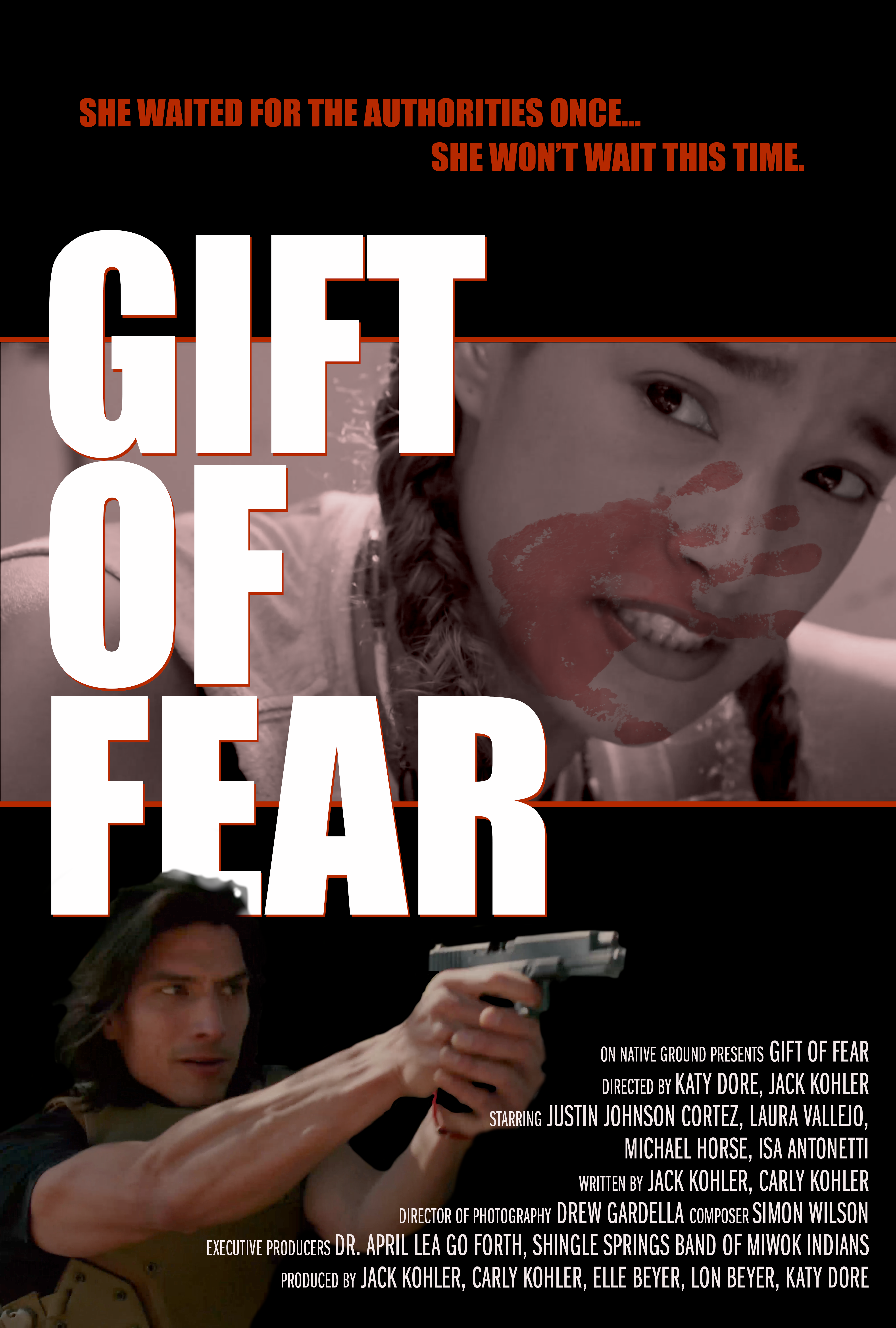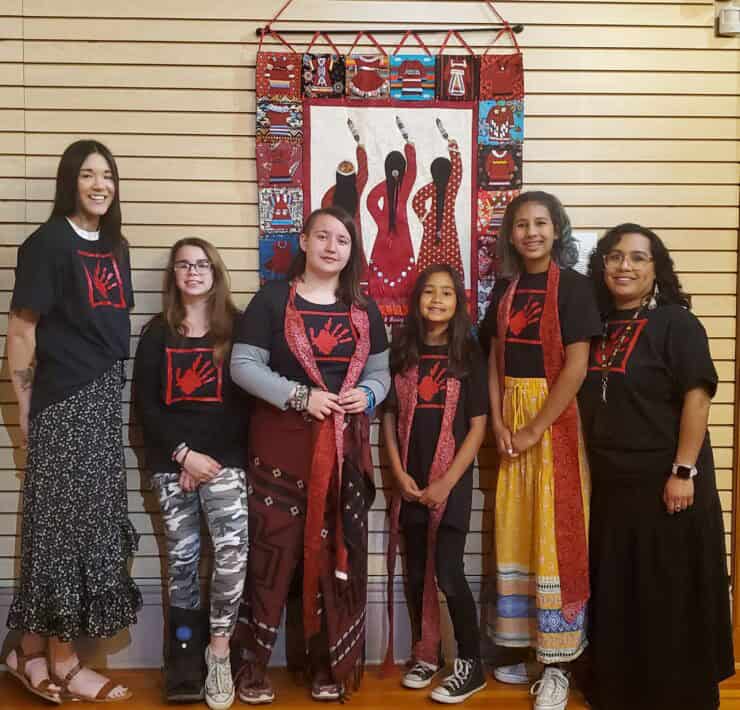
Filmmakers Jack and Carly Kohler Tell an MMIP Story Set in the Heart of the Hoopa Valley Community
By Christine Trudeau
Esteemed fixture of the California Indigenous filmmaking world Jack Kohler (Hupa/Yurok/Karuk) has a new feature film co-written with his daughter, Carly Kohler (Hupa/Yurok/Karuk), tackling the topic of Missing and Murdered Indigenous Peoples—a story told, Kohler says, for a non-Indigenous audience. Set in the Hoopa Valley community, this action-packed film, complete with car chase and shootout sequences, tells the story of Mili, a Hoopa teen girl growing up in the foster system after her mother is murdered. We find Mili getting placed into yet another new group home and new school, but this time she’s welcomed into a new community, the Dragon Fox jiujitsu dojo, that understands her and builds trust with her as she starts to create a new family, finding new friends and a love interest. But her past is catching up with her: at her previous group home, she was involved with a gang that’s set on coming after her.
Kohler is no stranger to the topic of MMIP. His work in film and theater, spanning two decades, has always focused on matters most pressing to his community. Kohler spoke with News from Native California by phone from his home last fall, in isolation while fighting off a bout of COVID, just as Gift of Fear was finishing up the film festival circuit.
When asked about what inspired his latest feature, he said, “we really made the movie for non-Natives.”
In April 2021, Kohler and daughter Carly were filming for a documentary they were planning at a Missing and Murdered Indigenous Persons march in Sacramento.
“We started interviewing all these relatives who had missing relatives in their life, whether it’s theirs, sisters, mothers, brothers,” said Kohler. “It was right at the end of COVID. So some of our footage wasn’t the best because everyone had a mask on so it’s just not as interesting watching people with masks talk.”
Then when Kohler got to review the footage with his daughter and executive producer, it was just really depressing and hard to watch, he says, because there was no positive outcome.
“Most of the cries from the relatives were ‘we need help’; we need the law enforcement to do something.’ Nobody’s doing anything,” said Kohler. “The main issue that Native people had with the authorities is that there was no outlet to go to, like the sheriffs or the FBI or the detectives; they would all hit dead ends and nothing would happen. It just was a very depressing scenario in almost every single case that we interviewed.”
So Kohler decided to look for people with positive stories who are trying to do something to alleviate this issue. They interviewed marathon runner Jordan Daniels, who ran in the Boston Marathon, often dedicating each marathon to a specific missing or murdered person, wearing a red handprint on her face. She then connected them to Kola Shippentower Thompson, an MMA fighter based in Oregon.
“She had a story to tell,” said Kohler. “She created this document to help circumvent the seventy-two-hour hold that most police authorities have before they search for a missing person. We thought ‘let’s go interview her,’ plus she was a pretty popular MMA fighter and jiujitsu fighter.” They went to one of her tournaments and interviewed her and that was the catalyst for Kohler and his daughter finding a route to take in telling the story.
“We had to veer away from making it a documentary because it was gonna be too difficult and there were so many documentaries starting to come out around the subject matter,” said Kohler. “Just going online and it’s mostly Native Americans audiences watching, and it’s like, how do you reach the non-Natives, to teach them about this crisis and this issue?”
Kohler points out that a lot of times non-Natives say MMIP is “a Native problem,” which is clearly not the case according to statistical data. “No, it’s not a Native problem. It’s something that was forced onto us because of where we were placed in our location and our situation with the reservation system and colonialism, so we decided, ‘Okay, we’re gonna make a feature film. We need some sort of storyline,’ and so the storyline was an MMA dojo and this was a place where youth would go for a positive outlet.”
This is Kohler’s sixth project that deals with MMIP. He did his first narrative short film on the subject in 2013 with K’ina kil: The Slaver’s Son, starring Martin Sensmeier (Tlingit/Haida) of The Magnificent Seven fame. K’ina kil was about the California gold rush, says Kohler, when three hundred thousand miners came to California and, not having brought many white women with them, took to kidnapping Indigenous women and girls. Then came the critically acclaimed rock opera Something Inside is Broken in 2016, currently airing nationally on PBS, also about the impact of the California gold rush as one of the genesis events creating the MMIP crisis in the state.
In 2018, Kohler got a call from then-New Mexico Congresswoman Deb Haaland (Laguna Pueblo), asking Kohler to shoot a PSA with her about two MMIP bills, the Not Invisible Act of 2019 and Savanna’s Act. Both were signed into law in 2020. Savanna’s Act “directs the Department of Justice (DOJ) to review, revise, and develop law enforcement and justice protocols to address missing or murdered Native Americans” and the Not Invisible Act of 2019 increases “intergovernmental coordination to identify and combat violent crime within Indian lands and of Indians.”
Then Kohler began work on Gift of Fear.
When considering their non-Native audience, the Kohlers decided to make the film an action film, weaving the MMIP narrative around lots of action.
“We’re trying to reach that younger audience, because a lot of older people do know about some of these issues, but it’s the younger audience that’s really hard to reach. They want to see action. They want to see lots of conflict, guns, violence, especially with all the horror movies that are out there,” said Kohler. “So, we knew we had to have lots of action. We had to make them really think about what they were seeing, trying to create that sense of urgency.”
Another device the Kohlers employ in the film is referred to at the end, where a 2021 quote from Secretary of the Interior Deb Haaland mentions the new Bureau of Indian Affairs department, the Missing and Murdered Unit (MMU), that will “tackle the decades-long crisis.” The film provides a take on what this might look like, with the character of Manny Donovan, played by Justin Johnson Cortez (Yaqui), working for the BIA’s Operation Lady Justice, Missing, and Murdered Unit.
“It would be great if that was possible and it’s sort of started, because the Yurok Tribe just hired their first MMU agent to work directly on their reservation for their tribe,” said Kohler. “I think it could be something that becomes adopted by a lot more tribes to try and solve these cases, and to try to become a deterrent for these outside forces who think no one’s gonna go looking for these missing persons.”
In May 2024, just ahead of Missing and Murdered Indigenous Women and Girls Day (also known as Red Dress Day) on the 5th, Kohler plans to have Gift of Fear available on iTunes, Amazon, and other streaming platforms.
The response to the film on the festival circuit has been very favorable, earning many awards, and audience feedback after the film screenings have been affirming of the film’s mission.
“We get a lot of tears and thank yous from Native folks who say ‘thank you for telling this story,’” said Kohler. “Then from non-Native people, it’s like ‘we had no idea this even happened in real life, in the real world,’ and that’s why we made the movie.”
This piece was reported and written with the support of an Ethnic Media Outreach Grant, made possible by the Stop the Hate initiative, funded by the California State Library (CSL) in partnership with the California Commission on Asian and Pacific Islander American Affairs (CAPIAA). To learn more about Stop the Hate or to report a hate incident, visit stopthehateca.org.






